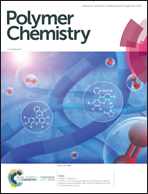Pushing the limits of robust and eco-friendly ATRP processes: untreated water as the solvent†
Abstract
Improvements of the original atom transfer radical polymerization (ATRP) allowed the use of eco-friendly solvents, such as water or alcohol/water mixtures, and the decrease of the metal catalyst concentration required, which is critically important considering the creation of industrially affordable ATRP processes. However, only high purity solvents have been used. Here, it is shown that untreated water (river, rain, stream, spring and sea) with different ionic compositions can be used without any purification as the polymerization solvent for the preparation of several well-defined water-soluble polymers by different ATRP variations. The polymerization kinetics and control over the molecular weight are similar to those obtained in ultrapure deionized water and the polymers present a suitable chain end-functionality for the preparation of well-defined block copolymers. Results revealed that the polymerization of the neutral poly(ethylene glycol) methyl ether acrylate (OEOA) monomer can be conducted with a halide salt (NaCl) concentration between 430 mM and 1.2 mM with no deleterious effect on both the polymerization rate and control over the molecular weight.



 Please wait while we load your content...
Please wait while we load your content...